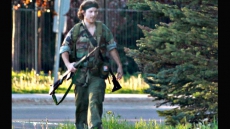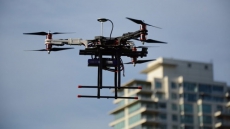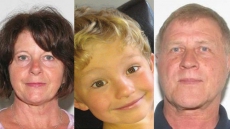The Alberta Court of Appeal has ruled that an Edmonton man should be extradited to the United States to face terrorism and murder charges.
Sayfildin Tahir Sharif is accused of murder and supporting a terrorist group that took part in suicide bombings in his native Iraq.
The Americans allege Sharif worked from Edmonton to help a Tunisian man enter Iraq in 2009 and detonate a truck filled with explosives at a military checkpoint, killing five U.S. soldiers.
Defence lawyers had argued before the Appeal Court that RCMP didn't allow Sharif access to a lawyer or interpreter the day of his arrest, and transcripts of police interviews show he didn't understand what was going on.
They also said allegations against their client came from three people — including his brother — who were tortured by investigators in Iraq.
The Appeal Court ruled that none of the arguments merited keeping Sharif in Canada.
The court agreed the extradition judge should not have outright rejected the torture allegations by Sharif's brother. It also said the judge should have asked the federal attorney general to disclose evidence about the brother's interrogation or strike the evidence from the deportation proceedings.
Still, the court said, those failures weren't enough to stop the extradition.
"The information obtained from that interview constituted a minute part of the information contained in the record of the case, leaving a considerable body of evidence to support the extradition judge's decision to commit," the appeal judges wrote.
Sharif, who also goes by Faruq Khalil Muhammad Isa, is an ethnic Kurd who was born in Iraq but moved to Toronto as a refugee in 1993. Four years later, he became a Canadian citizen.
He has been in custody since his arrest in 2001 at an Edmonton apartment, where he lived with his girlfriend and her children.
Prosecutors contend that evidence from intercepted Internet and phone conversations shows Sharif was directly involved in supporting the Tunisian terrorists who conducted the suicide bombing by helping connect with other supporters as they made their way across the Middle East to Iraq.
The terror network is also accused of blowing up an Iraqi police station, killing seven Iraqi officers.
The Appeal Court said Sharif had access to a lawyer after his arrest, was aware of his right to silence and was not intimidated by investigators.
"While he professed to be afraid, it is obvious from the context of the interviews that his fear was not generated by the interviews or the interviewers, but by his realization of the information they had about him," the judges wrote.
Canada's justice minister granted extradition last summer after receiving assurances from the U.S. that Sharif wouldn't face the death penalty. Defence lawyers also received a letter from U.S. authorities promising the man wouldn't be held indefinitely in pre-trial detention.
Sharif was appealing the justice minister's decision as well as a judge's original 2012 ruling that there was enough evidence to extradite Sharif on two charges.
One of the grounds that Sharif's lawyers used in appealing the minister's decision to grant extradition was that life imprisonment with no chance of parole in the U.S. is "unjust and oppressive" under the Charter of Rights and Freedoms.
The Appeal Court, however, suggested the bar for such an argument was higher. It cited a Supreme Court of Canada ruling which gave examples of stoning adulterers or amputating the hands of thieves as punishments which violate Canadian values of justice.
"In our view, a sentence of life imprisonment without parole, while not a sentence available in Canada ... would not sufficiently shock the conscience of Canadians such that his surrender to face those charges would be unjust or oppressive."





